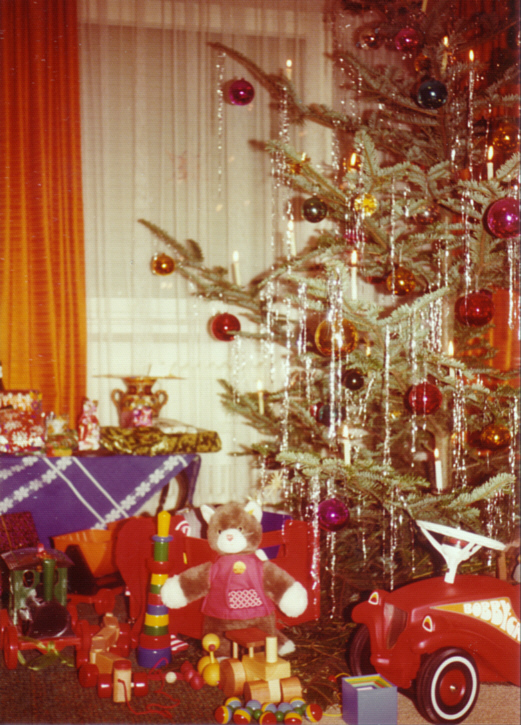The most wonderful time of the year


In the past, I did always think that Christmas was the most wonderful time of the year – and to pile on the clichés, I also wished it could be Christmas every day. Not surprising, really, given how magical Christmas was at my house when I was a child. Candle arches lighting up the windows, carols echoing through the house, the delicate scent of pine wafting from the Christmas tree. The gingerbread house covered in icing waiting temptingly on the sideboard, the enticing spicy aroma of pulla baking, the excitement of hanging out our stockings and the anticipation of a glorious pile of presents waiting on Christmas morning. When I saw the Christmas special of Grumpy Old Women, I couldn’t understand why they were all complaining so much about Christmas. There was no need for them to rush around doing all that cleaning, shopping and baking, they brought it all on themselves. Like my Mum bursting into fits of tears or temper – why couldn’t she just relax and embrace the peace and joy of Christmas?
In recent years, though, I have to admit that I seem to be on the slippery path towards becoming a GOW myself. The run-up to Christmas has changed from a period of joyful anticipation into a stressful gauntlet of demands, each of which is very hard to refuse precisely because ‘it’s all about making it a special time of the year and showing that you care’. I am inundated with requests for present ideas for me, my partner, and my children, and have to rush about the (virtual) shops purchasing and then wrapping and posting gifts in my turn, as somehow buying things ceases to become a commercial activity at Christmas, and turns into a symbol for your love for your family. Suggest that fewer presents would be fine, and you’re halfway to being Scrooge. Schools, work, voluntary organisations and neighbourhoods each have their own celebration, which absolutely must be attended because, after all, Christmas is a time of togetherness. There is a long list of Christmas cards to be written, as while intermittent contact with old friends and distant family is perfectly acceptable for the rest of the year, a failure to send a Christmas card is a major faux pas. Being both by nature a quiet homebody and mortally afraid of causing offence, I find this whirlwind of social expectations very stressful and draining.

By Till Westermayer from Freiburg, Germany – Cookies III, CC BY-SA 2.0, https://commons.wikimedia.org/w/index.php?curid=12427992
By Andrew Kelsall – originally posted to Flickr as gingerbread house 6, CC BY 2.0, https://commons.wikimedia.org/w/index.php?curid=10242479
By Jebulon – Own work, CC0, https://commons.wikimedia.org/w/index.php?curid=17787892
By Jay Springett from London – rumThis photograph was submitted to Wikimedia Commons by “Will Murray (Willscrlt)”., CC BY-SA 2.0, https://commons.wikimedia.org/w/index.php?curid=28574587
To be completely honest, though, a large part of the pressure comes from the strangest source of all – myself. Quite content to ignore dust bunnies, untidy piles of children’s artworks and sticky kitchen surfaces from January through November, the approach of December works a bizarre transformation. Like an expectant mother in the throes of the nesting instinct, I start getting urges to clean the whole house from top to bottom – a completely pointless activity given we have very few visitors over the festive period, and my partner and children are about as sensitive to mess as a polar bear is to a draught. Never trained in preparing roast dinners, I feel no pangs of conscience in delegating responsibility for our Christmas and New Year meals to the seasonal assortment of a popular supermarket chain. However, the seductive siren call of the domestic goddess does awaken the desire to pull off all sorts of baking feats – a yule log cake covered in miniature marzipan decorations, a Christmas tree pulla, a gingerbread house…? I am totally against consumerism, but as Christmas Eve approaches, a red haze descends over my eyes, and in my panic that my gifts will not be enough, I can barely trust myself when left alone with an internet connection and credit card.
It’s almost enough to suspect some kind of Stepford wife-style conspiracy. But the cause is much closer to home – my memories of those wonderful childhood Christmases. Having loved them so much, of course I want to give my own children that same experience. But if I do so, then the price is embracing the same role as my mother, spending Advent and Christmas working like mad, stressed out and cut off from the rest of the family. My Mum has now been dead for sixteen years, and I would gladly trade in all those glorious festive memories for more time spent cuddled up next to her on the sofa, just talking to each other. What is more, if I do as she did, then I communicate the same ideal to my own daughters, offering them idyllic Christmases now at the cost of Christmas purgatory in the future.
Paradoxically, those closest to me are those who make the fewest demands on me at Christmas time. The challenge is for me to change my own thinking – to break through that Pavlovian reaction of presents+cleaning+baking = love. Instead, I need to turn the equation around and put the love first, then focus on what best expresses that love at Christmas. Less cleaning, less kitchen duty, less shop-bought tat – more spending time together, but also more quiet space to do our own things. If I can do so, then once we have survived the Advent rush, we can retreat to our home and enjoy true Christmas peace – together as a family.